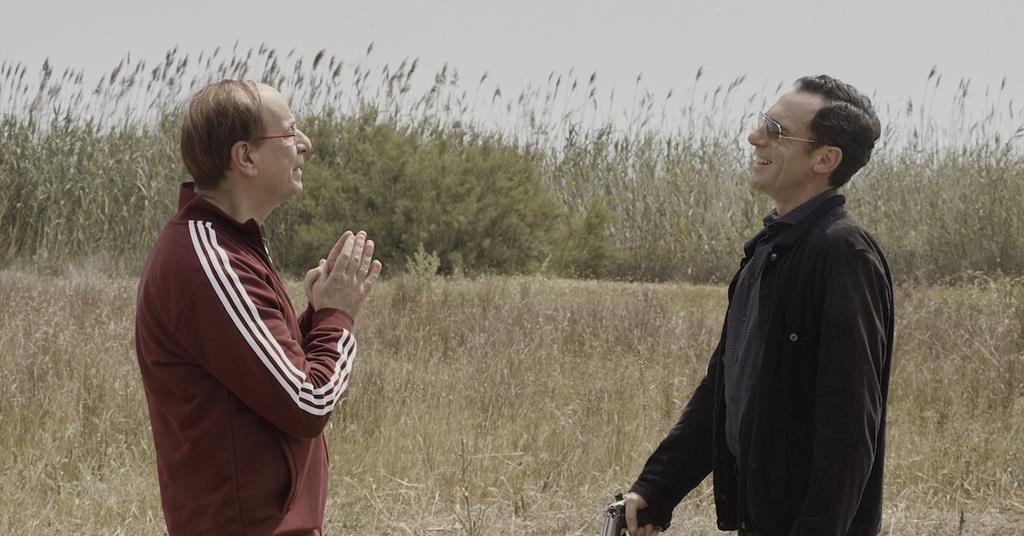Unveiling the Secrets of Sicily: A Cinematic Journey with 'Sicilian Lessons'

Imagine, if you will, a former politician, Catello (played with a kind of bemused resignation by Toni Servillo), just released from a gloriously unflattering six-year stay in prison. Our beleaguered protagonist has not just lost his political stature and investments but, more critically, his wife’s respectful gaze. In what seems to be the modern version of “you can’t go home again,” his spouse would actually prefer he experience a heart attack over a stroke—ah, the tenderness of marital bliss.
With such charming domestic dispositions, it's no wonder that when the Secret Service tips its hat and requests Catello’s collaboration in a daring mission involving his own godson, a mafia bigwig named Matteo (the compellingly elusive Elio Germano), he has no choice but to dive right into the murky waters of organized crime. Their correspondence takes place through adorable little “pizzini,” those whimsical Mafia notes that seem so outlandishly charming compared to their sinister implications. One can’t help but snicker at the notion of a former mayor playing hide-and-seek with the underworld. It sounds like the makings of an excellent episode of “Candid Camera.”
Yet, dear reader, what should unfold is far from the exhilarating dance of subterfuge and betrayal that one might hope for. How can one make a meal from this platter of promise? Director duo Fabio Grassadonia and Antonio Piazza seem to serve up a dish that's more flabby than thrilling, struggling under the cumbersome weight of its own ambitious setup, while the comedic elements feel labored and more like a sympathetic pat on the back than genuine belly laughs.
With each flickering frame, organized crime’s fingerprints, smudged yet unmistakable, wrap around the film. The directors’ previous works, including the attention-grabbing Salvo and the heart-tugging Sicilian Ghost Story, set a high bar; yet here, the tone shifts from gravitas to guffaws, attempting a comic twist that somehow seems more of a contortionist’s act than a graceful pirouette. You could almost hear the collective sigh of the audience wondering if the humor, relying heavily on Servillo's flourishes of ornate dialogue, would resonate better in its native tongue—in other words, could the Italians be having a grand laugh while we non-speakers merely nod?
Now, the selling point of this film is undoubtedly Servillo. His performance as this slippery, somewhat ridiculous figure drips with a sharp wit that pulls you in like a moth to a flame. And isn’t that theatrical gravitas simply a delight? With that sad basset hound demeanor, he makes you almost forget the cumbersome nature of some of the dialogue. Contrastingly, Germano embodies the dangerous allure of a mafia kingpin reduced to puzzles and brooding reflections—yes, I’m sure that life of leisure does involve a lot of existential pondering.
But as the plot thickens, so does the narrative’s confusion, often communicated through gag-inducing flashbacks that oscillate between establishing character backgrounds and testing viewer patience. We meet Matteo as a child in a brutal initiation that would make anyone reconsider family loyalty—a blood-spattered affair befitting a horror film, not a heartwarming comedy. And just when you think things might pick up in the early 2000s, as Matteo mourns his father’s death, we’re left with Catello’s sappy letters trying to win over a heart that seems perpetually closed.
Ah, but herein lies the main culprit—the rigid runtime. With scenes dragging on more than necessary, much like Castello’s overzealous letter-writing, the narrative ambles along, rarely getting to the point with any flair. Lest we forget, moments that could have elevated the storytelling feel entirely redundant—think of them as the universe’s way of reminding us that brevity is truly the soul of wit.
Despite attempts to jazz things up with an amusing musical score, which could have made even the most mundane moments twirl with humor, what remains is a gallant effort that stumbles more than it struts. So, my friends, while the production may boast fine names like Indigo Film and the magic of Luca Bigazzi’s cinematography, “Sicilian Letters” ends up more like an overly sentimental greeting card than the wild romp through the Sicilian underbelly that one might have wished for. After all, what we really crave from our mob comedies is a little more zing and a lot less zzz.

